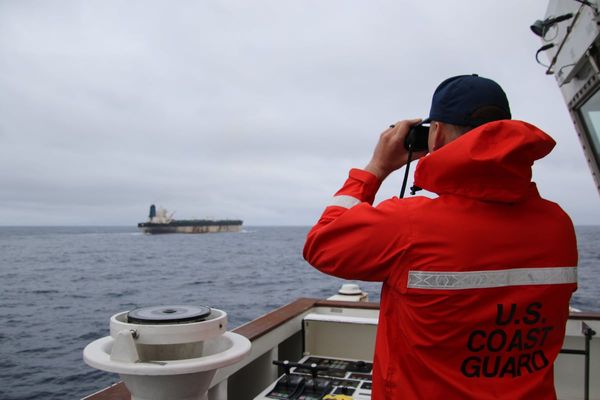
Despite the departure of the Wagner Group from Mali, Russia is continuing to strengthen its military presence in the country through its Africa Corps. Using satellite imagery, shipping logs and eyewitness reports, journalists from RFI have confirmed that Russia is discreetly shipping in large quantities of military equipment via the port of Conakry in neighbouring Guinea.
Data collected by RFI's Info Vérif investigative unit shows that Russia is using a logistics hub in Guinea's capital Conakry, on Africa’s west coast.
So far this year, three convoys have been transported by sea from Russia to the port of Conakry, before reaching land-locked Mali by road, RFI found.
Mali’s national news channel (ORTM ) confirmed the arrival of a military convoy made up of several dozen transport trucks, escorted through Bamako by Malian police, on 31 May.
According to the report: "The Malian army has strengthened its operational capabilities through the acquisition of new equipment."
The source of this equipment was not mentioned in the report, and the Malian Armed Forces (FAMa) have not commented officially about the arrival of the convoy.
Wagner replaced in Mali by Africa Corps, another Russian military group
The news came a week before Russia's decision on 6 June to pull the paramilitary group Wagner out of Mali and replace it with the Africa Corps, which is more closely controlled by the Kremlin.
Wagner has been building its presence in Africa for a number of years and has profited from a shift in the political landscape brought about by several military coups.
Coups in 2020 and 2021 under junta leader Assimi Goita saw Mali break off ties with its former colonial power France and pivot towards Russia for political and military support.

Sahel alliance
Mali is one of three countries in the Alliance of Sahel States, all of whom signed defence agreements with Russia in 2023 to receive arms and military training to fight against jihadist insurgents.
RFI's investigative unit obtained exclusive footage and testimonies showing that Russia is going to great lengths to assure its military logistics.
Using ship tracking tools, RFI reports that two Russian cargo ships, both under international sanctions, docked in the Guinean capital between 25 and 28 May.
The ships – the Baltic Leader and the Patria – are part of Russia's shadow fleet, discreetly transporting weapons to the Kremlin's various partners. The Baltic Leader was part of the "Syrian Express" – the name given to Russian ships providing naval links between Syria and Russia.
Sahel ministers in Russia for talks after breaking with western allies

RFI's Dakar team passed on testimonies which confirmed a sighting of the convoy on 28 May at around 6pm local time, between Kindia and Mamou, on Guinea's National Road 1, heading for Mali.
Nearly 1,000 kilometres separate the port of Conakry and Bamako, a journey of around 16 hours.
The timeline of events corresponds with various data RFI collected from open sources.
The lack of amateur footage from Guinea concerning this convoy can be partially explained by the risks involved. "In Guinea, filming or photographing anything related to the army can be very dangerous," a local source told RFI.

RFI reports that two other Russian-flagged cargo ships – the Siyanie Severa and the Adler, also under Western sanctions – had followed the same route in January.
To track their course, RFI obtained images from the North American company Maxar, which specialises in satellite manufacturing and Earth observation.

'Less vigilant'
Geographically, Conakry is an ideal entry point for accessing the Sahel. Russian ships can reach the port without arousing too much suspicion, and all within a relatively short timeframe.
"[Guinea] is a country that is less vigilant in terms of surveillance compared to other places, like Côte d’Ivoire or Cameroon, which would not necessarily agree with the arrival of two sanctioned ships transporting weapons into the region," Lou Osborn of the All Eyes On Wagner collective told RFI.
"Russia has also established a foothold in Equatorial Guinea and is trying to chip away at this area," Osborn explained.
Among the many Russian ships present in the Gulf of Guinea, several "have been used by the Russian military since the beginning of the conflict in Ukraine to transport weapons from Iran, North Korea and Syria to Russia," Osborn added.
"This Russian military presence has been partially refocused on Africa, probably to compensate for the logistical deficit caused by the sudden regime change in Syria."

Types of equipment
At this stage, it is not clear whether the new convoy of military goods is intended to reinforce the Malian armed forces or the Russian soldiers of Africa Corps, as some vehicles have not been observed on Malian soil before.
Yann Boivin, an armoured vehicle expert and host of the blog Blablachars analysed the most recent images and noted in particular the presence of "a BTR electronic warfare armoured personnel carrier, as well as a Vystrel multi-role armoured vehicle equipped with a Shipunov 2A42 automatic cannon".
The convoy also included Spartak armoured vehicles, several tanker trucks, transport trucks, at least one inflatable boat and several 122 D30 and 152 D20 artillery pieces – compatible with Mali's current needs on the ground, according to Boivin.
This is in contrast to January’s convoy, which comprised other equipment which Boivin said was more likely to have been used in a European context and transported to Mali to be used by Russian operatives.
This article is based on an original report in French by RFI's Grégory Genevrier and Olivier Fourt. It has been edited for clarity.







